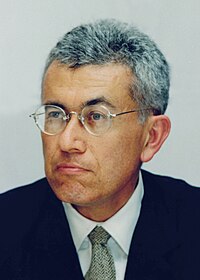Roberto Mangabeira Unger
| Roberto Mangabeira Unger | |
|---|---|
 |
|
| Born |
24 March 1947 Rio de Janeiro, Brazil |
| Residence |
Cambridge, Massachusetts and Brazil |
| Alma mater |
Faculdade de Direito da Universidade Federal do Rio de Janeiro (Bacharel em Ciencias Juridicas e Sociais) Harvard Law School (LL.M., J.S.D.) |
| Occupation | Philosopher, Professor, Politician |
| Era | Late 20th century, early 21st century |
| Website | Roberto Mangabeira Unger profile |
Faculdade de Direito da Universidade Federal do Rio de Janeiro (Bacharel em Ciencias Juridicas e Sociais)
Roberto Mangabeira Unger (born 24 March 1947) is a philosopher and politician. He has developed his views and positions across many fields, including social, political, and economic theory. In legal theory, he is best known by his work in the 1970s/80s while at Harvard Law School as part of the Critical Legal Studies movement, which is held to have helped disrupt the methodological consensus in American law schools. His political activity helped bring about democracy in Brazil, and culminated with his appointment as the Brazilian Minister of Strategic Affairs in 2007 and again in 2015. His work is seen to offer a vision of humanity and a program to empower individuals and change institutions.
At the core of his philosophy is a view of humanity as greater than the contexts in which it is placed. He sees each individual possessed of the capability to rise to a greater life. At the root of his social thought is the conviction that the world is made and imagined. His work begins from the premise that no natural social, political, or economic arrangements underlie individual or social activity. Property rights, liberal democracy, wage labor — for Unger, these are all historical artifacts that have no necessary relation to the goals of free and prosperous human activity. For Unger, the market, the state, and human social organization should not be set in predetermined institutional arrangements, but need to be left open to experimentation and revision according to what works for the project of individual and collective empowerment. Doing so, he holds, will enable human liberation.
Unger has long been active in Brazilian opposition politics. He was one of the founding members of the Brazilian Democratic Movement Party and drafted its manifesto. He directed the presidential campaigns of Leonel Brizola and Ciro Gomes, ran for the Chamber of Deputies, and twice launched exploratory bids for the Brazilian presidency. He served as the Minister of Strategic Affairs in the second Luiz Inácio Lula da Silva administration and the beginning of the second Dilma administration. Unger is also the subject of the feature documentary Visions for the Future directed by Robert Rippberger chronicling his work in Brazil in the Amazonian state of Rondônia putting theory into practice.
...
Wikipedia
